 Petzlover
Petzlover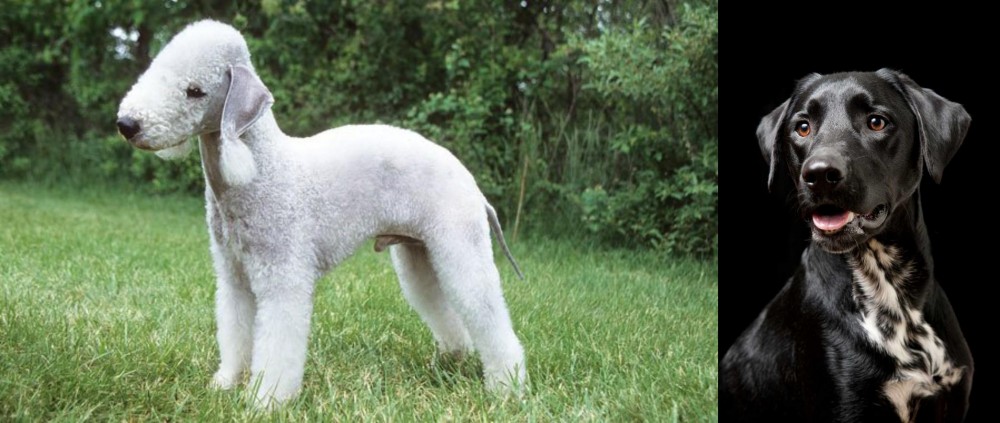 Bedlington Terrier is originated from United Kingdom but Dalmador is originated from United States. Bedlington Terrier may grow 14 cm / 5 inches shorter than Dalmador. Bedlington Terrier may weigh 21 kg / 46 pounds lesser than Dalmador. Both Bedlington Terrier and Dalmador has same life span. Both Bedlington Terrier and Dalmador has almost same litter size. Bedlington Terrier requires Low Maintenance. But Dalmador requires Moderate Maintenance
Bedlington Terrier is originated from United Kingdom but Dalmador is originated from United States. Bedlington Terrier may grow 14 cm / 5 inches shorter than Dalmador. Bedlington Terrier may weigh 21 kg / 46 pounds lesser than Dalmador. Both Bedlington Terrier and Dalmador has same life span. Both Bedlington Terrier and Dalmador has almost same litter size. Bedlington Terrier requires Low Maintenance. But Dalmador requires Moderate Maintenance
 Originally known as Rodbury Terriers or Rothbury’s Lambs, and renowned for looking like a lamb, the Bedlington Terrier was bred in the village of Bedlington in Northumberland. They’ve had other names too and were also known as ‘gypsy dogs’ and this is because gypsies used them to hunt.
Originally known as Rodbury Terriers or Rothbury’s Lambs, and renowned for looking like a lamb, the Bedlington Terrier was bred in the village of Bedlington in Northumberland. They’ve had other names too and were also known as ‘gypsy dogs’ and this is because gypsies used them to hunt.
The Bedlington Terrier Club was established in 1875 and the National Bedlington Terrier Club was formed in England in 1877. The breed has links with the Dandie Dinmont Terrier, the Kerry Blue Terrier and the Soft Coated Wheaten Terrier. When you look at the slightly arched back, it could also be related to the Whippet. They have been crossed with Whippets to get that speed, and feisty character.
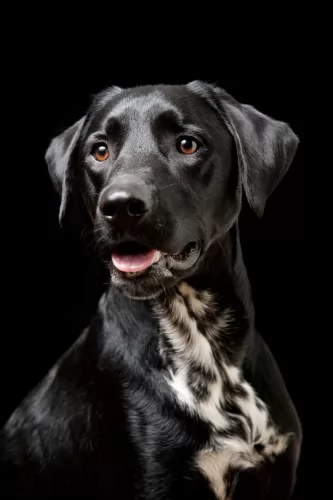 The Dalmador is a cross-breed – a mix between a Dalmation and a Labrador, and because it is a a fairly new breed you won’t find much information about the dog’s origins.
The Dalmador is a cross-breed – a mix between a Dalmation and a Labrador, and because it is a a fairly new breed you won’t find much information about the dog’s origins.
We do know that the Labrador originated in Canada and that the Dalmation comes from Croatia. Both these dog breeds have their own interesting histories. The Dalmador is a hybrid dog and isn’t a member of the American Kennel Club.
They started coming about from the 1980s when mixing one pure-breed dog with another became popular.
 Don’t let their lamb-like appearance fool you – the Bedlington Terrier is a plucky dog who has some amazing speeds when it comes to swimming and running. This is an intelligent dog too and every bit a Terrier in spirit. Their tenacity has seen them being used in dog fighting as well.
Don’t let their lamb-like appearance fool you – the Bedlington Terrier is a plucky dog who has some amazing speeds when it comes to swimming and running. This is an intelligent dog too and every bit a Terrier in spirit. Their tenacity has seen them being used in dog fighting as well.
The Bedlington Terrier stands at about 41cm in height and weighs between 8 – 10kg. Muscular, with a deep chest, graceful and lithe, not only does he look like a lamb but the dog’s expression is gentle too with bright deep-set eyes. When it comes to his coat, the dogs have blue, sandy or liver color coats and the coat has tan markings in some areas.
The coat is shaggy and is made up of hard- and soft hair that will need to be regularly trimmed. Known as a hypoallergenic breed, the coat is also described as thick and linty. The ears are floppy with rounded tips, and are thin and velvety in texture with a small silky tassel at the tip. The longish tail is set low and tapers down to a point.
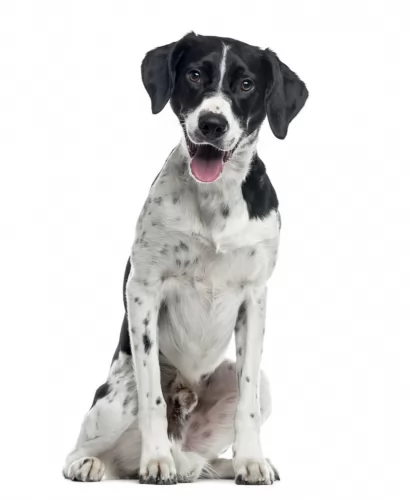 The Dalmador is a cross breed dog which comes from crossing the Labrador Retriever with a Dalmatian. The result is a muscular, well proportioned body.He has floppy ears and a long tail.
The Dalmador is a cross breed dog which comes from crossing the Labrador Retriever with a Dalmatian. The result is a muscular, well proportioned body.He has floppy ears and a long tail.
He is medium to large sized dog and can stand up to 58cm in height and weigh between 25 and 32kg. No two dogs look the same and some dogs gravitate more towards the one breed while others toward the other.
Most Dalmadors have the spotted coat, although the coat could have very visible spots or maybe just a few dots on the fur. Then again there are some Dalmadors where the coat is more of a solid color in brown or black or cream with some white patches. The double coat is short and dense and he is quite a heavy shedder.
The Dalmador is a gentle, friendly dog, making him a great family pet. You can’t really say exactly what temperament your Dalmador will have as he could inherit either the Dalmatian’s more aloof nature or he could inherit the friendly character of the Labrador.
He is quite likely to be even-tempered and is amicable with other pets in the home. He is alert too and this makes him a good watchdog. Because the Dalmador is the hybrid of two active, alert, intelligent breeds you can expect a dog which for some will be quite a handful. It is why training and socialization can be excellent for the Dalmador as it will calm him down, turning him into an obedient dog who comes and sits when told.
If you’re looking for an energetic, active and highly social dog, the Dalmador will suit an active family that can join in with all his high jinks.
 You can’t miss the Bedlington Terrier – he has a striking resemblance to a lamb. The curly coat is interesting too – a mix of hard- and soft hair. He is friendly, loyal and devoted to his human family and is known to be a brave, courageous, feisty dog with the inclination to bark more. Socialization and training can change this though. He gets on well with children and other pets in the home. He isn’t aggressive but if taunted, he can put up a good fight.
You can’t miss the Bedlington Terrier – he has a striking resemblance to a lamb. The curly coat is interesting too – a mix of hard- and soft hair. He is friendly, loyal and devoted to his human family and is known to be a brave, courageous, feisty dog with the inclination to bark more. Socialization and training can change this though. He gets on well with children and other pets in the home. He isn’t aggressive but if taunted, he can put up a good fight.
This is a dog that can adapt to his surroundings so he slots in well to both city- and country living. Wherever he lives, he will need adequate exercise.
The present-day Bedlington Terrier, inducted by the American Kennel Club in 1967, is not a lamb by any means, and by choosing to have him as your pet, you’ll be amazed at his wonderful qualities that make him such in ideal companion.
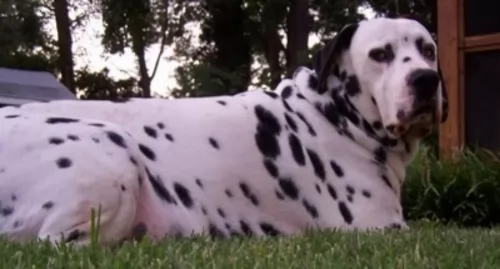 The wonderful Dalmador is such a easy-going, cheerful dog full of surprises really, as you never know which dominant traits he will inherit from either of the two dogs involved in his making.
The wonderful Dalmador is such a easy-going, cheerful dog full of surprises really, as you never know which dominant traits he will inherit from either of the two dogs involved in his making.
Friendly and social, he loves his human family and is totally loyal and loving toward them. Even tempered and faithful, if you’re looking for a wonderful 4-legged friend and companion, the Dalmador promises to make you a splendid pet.
 Bedlington Terriers are a healthy breed, but just like other dogs, they are prone to some common dog illnesses. You can always ensure that your Bedlington reaches his 12 – 14 years of age lifespan by ensuring his vaccines are kept up to date, that he is fed excellent food and fresh water, he is exercised and that he is loved and cherished. Also, if you’re looking to buy a Bedlington, find a reputable breeder.
Bedlington Terriers are a healthy breed, but just like other dogs, they are prone to some common dog illnesses. You can always ensure that your Bedlington reaches his 12 – 14 years of age lifespan by ensuring his vaccines are kept up to date, that he is fed excellent food and fresh water, he is exercised and that he is loved and cherished. Also, if you’re looking to buy a Bedlington, find a reputable breeder.
Some common health issues to look out for in your Bedlington Terrier include -
Hip dysplasia
Different eye diseases
Hypothyroidism
Copper storage hepatopathy or Liver Disease – this is a disease which can be inherited and where large amounts of copper accumulate in the tissues of the liver. The result is inflammation and cell damage and this can lead to liver failure and even death. Abdominal swelling, jaundice and weight loss are symptoms to watch for with this disease.
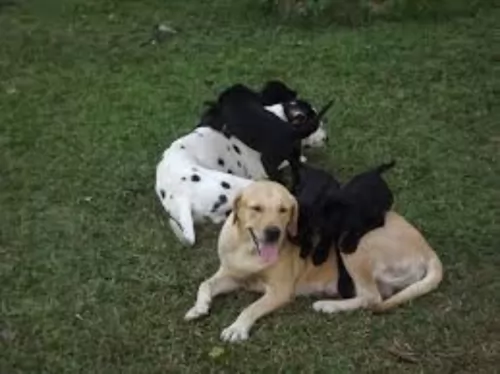 The Dalmador is a hybrid dog and they don’t experience the same health issues that the pure bred dog contends with. The Dalmador has a life expectancy of 10 to 14 years and he can reach this age if you give him all the doggy care he deserves as a 4-legged member of your family.
The Dalmador is a hybrid dog and they don’t experience the same health issues that the pure bred dog contends with. The Dalmador has a life expectancy of 10 to 14 years and he can reach this age if you give him all the doggy care he deserves as a 4-legged member of your family.
Apart from a common dog ailment – hip dysplasia, bloat and obesity are also common problems for your dog.
Bloat is a serious health condition that can actually be fatal because its a twisted stomach where trapped gas puts pressure on the diaphragm.
You will notice the swollen stomach of your pet. Larger breeds are more prone to suffer from bloat because of being deep-chested. Also known as gastric dilatation-volvulus, a vet will need to intervene with this ailment as it can be life-threatening.
 The Bedlington Terrier is a lively, cheerful companion at home and is somewhat more relaxed than other terrier breeds. Affectionate and loyal, he just loves to spend time with his human family. He’ll love to be your companion on a walk and he gets delighted when you’re ready to play ball games with him. He makes a great friend for children too, and even though he makes a good watchdog, he will welcome any visitors you have. When trained and socialized he becomes an obedient, well behaved member of the family.
The Bedlington Terrier is a lively, cheerful companion at home and is somewhat more relaxed than other terrier breeds. Affectionate and loyal, he just loves to spend time with his human family. He’ll love to be your companion on a walk and he gets delighted when you’re ready to play ball games with him. He makes a great friend for children too, and even though he makes a good watchdog, he will welcome any visitors you have. When trained and socialized he becomes an obedient, well behaved member of the family.
The Bedlington coat sheds a little but the rough coat will need to be trimmed regularly and the coat brushed twice a week to ensure no tangling and to remove loose hairs. Also, regular cleaning of teeth and ears can help ensure that harmful bacteria doesn’t build up, ensuring the overall health of your dog.
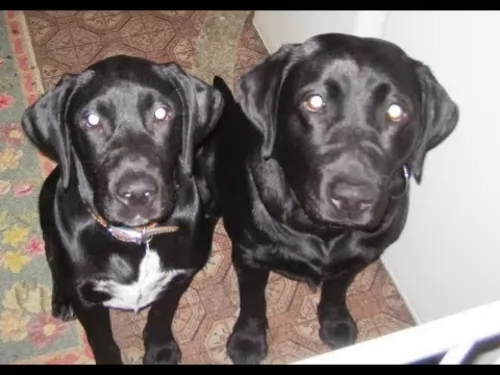 The Dalmador is a medium to large dog so you want to be feeding him one or two bowls of food a day. You want to be giving your Dalmador top-quality food to ensure good health. The lower quality foods are inclined to have ingredients in them that aren’t good for your pet.
The Dalmador is a medium to large dog so you want to be feeding him one or two bowls of food a day. You want to be giving your Dalmador top-quality food to ensure good health. The lower quality foods are inclined to have ingredients in them that aren’t good for your pet.
Always try to include some home-made food into your pet’s diet such as cooked brown rice, cooked chicken and vegetables. You can mix this into some of his dry kibble. It is important to include some raw meat into his diet from time to time as well.
Clean water must be constantly available. Without good quality food and water, you jeopardize the health of your pet.
He isn’t going to require much maintenance so a good brush twice a week will rid him of loose hairs and keep his coat shiny and glossy.
Other things to check regularly are his ears and to brush his teeth 2 or 3 times a week. Don’t neglect giving him a good amount of exercise too.